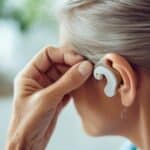Decoding Tinnitus: Unveiling the NHS’s Revolutionary Approach to Treatment and Care
- Get link
- X
- Other Apps
Table Of Contents
Introduction
What do a teakettle, the hissing of summer snakes, and the pinging of a metal pencil against glass all have in common? For roughly one in ten people in the UK, this odd assortment represents a cross-section of what it feels like to live with tinnitus – a persistent ringing or buzzing sensation in the ears. Tinnitus can significantly impact one’s quality of life, and handling this condition requires a comprehensive understanding of its diagnosis, treatment, and mitigation. That’s where the National Health Service (NHS) comes to play. The NHS provides various aids for tinnitus, such as pulsatile tinnitus NHS treatments and tinnitus NHS direct services, which offer immediate, round-the-clock assistance to tinnitus sufferers.
What is Tinnitus?
Well, let’s delve into understanding the culprit here. Tinnitus is perceived noise or ringing in the ears, a common problem affecting about 15% to 20% of the population. While often described as “ringing,” the sound can also be like hissing, clicking, or buzzing. Tinnitus isn’t a condition itself—it’s a symptom of an underlying condition, such as age-related hearing loss, an ear injury, or a circulatory system disorder.
But here’s the kicker: have you ever noticed that your tinnitus seems worse when you have a headache? Well, some recent research by the NHS suggests there could be a link between the two. But more on that later.
Pulsatile Tinnitus NHS: An Overview
Let’s talk about a specific type of this condition- pulsatile tinnitus NHS. This isn’t your regular run-of-the-mill tinnitus. In this form, folks perceive sounds that beat in time with their pulse. It’s usually due to blood vessel problems, changes in the ear canal, or issues with the muscles or nerves. Notably, the NHS’s approach to treating pulsatile tinnitus is quite different from regular tinnitus. Pulsatile tinnitus treatments often aim at addressing the root cause, often involving the vascular system.
Tinnitus and Headaches: NHS Insights
Now, remember the connection between headaches and tinnitus we mentioned before? Let’s delve into that. Some studies reported on tinnitus and headaches NHS have found a strong correlation between the incidence of pulsatile tinnitus and headaches. Pulsatile tinnitus may come with headaches because the same conditions that cause headaches, such as high blood pressure or vascular disorders, also often lead to pulsatile tinnitus. Experts from the NHS are exploring this connection more profoundly, hoping it will lead to more effective management strategies for people suffering from both conditions.
Tinnitus Hearing Aid NHS: Solutions at Hand
Can you remember the white noise machines used to induce sleep or the symphony of sounds used during a spa session? For tinnitus sufferers, modern audiology has something similar in the offering. Welcome to the world of tinnitus hearing aids. According to NHS, these aids don’t just amplify external sound but also produce white noise that can distract you from the tinnitus. Intriguingly, over time, your brain can learn to ignore the tinnitus, a phenomenon known as “habituation”. And just like no two people’s taste in music is the same, the NHS ensures these white noises can be personalized to your hearing profile and preferences. How’s that for bespoke?
NHS Tinnitus: Understanding the Direct Approach
Now, how does the NHS ensure world-class tinnitus care? Let’s take a closer look at the NHS’s direct approach to dealing with this condition. The program, appropriately named “NHS tinnitus direct”, follows a multi-pronged strategy involving diagnosis, treatment, and care. The NHS has streamlined mechanisms to manage tinnitus, including cognitive behavioral therapy, sound therapy, mindfulness-based stress reduction, and hearing aids. In essence, they ensure a tailor-made approach to dealing with your tinnitus – an orchestra of services at your ear’s disposal!
Case Studies of Tinnitus Patients and NHS
You might think, “All these sounds perfect but does it work in real life?” Let’s turn to John and Sarah, both beneficiaries of the NHS’s tinnitus strategies. John, a construction worker, started using a hearing aid from the NHS after experiencing tinnitus. Today, he reports a significant decline in his issues. Sarah, a homemaker, battled with anxiety and insomnia due to tinnitus. Cognitive behavioral therapy as part of the NHS tinnitus direct program, helped her cope, ultimately improving her sleep and reducing anxiety.
Conclusion
Wrapping it up, the NHS, with its arsenal of diagnostic, treatment, and care strategies, like the tinnitus hearing aid and NHS tinnitus direct program, stands at the forefront of tinnitus management. As evident from John and Sarah’s examples, the services work effectively in managing symptoms and improving quality of life. While tinnitus management is no walk in the park, advancements in sound therapy and cognitive-behavioral strategies have made significant strides in providing relief. So, whether you’re hearing the pinging or the hissing in your ears, remember, the NHS has a symphony of solutions at your disposal!
Tinnitus NHS - Frequently Asked Questions (FAQ)
Tinnitus is a condition characterized by a perceived noise or sound in the ears without an external sound source. This sound can be a ringing, humming, buzzing, or hissing and is a symptom of an underlying condition like hearing loss or a circulatory system issue.
NHS offers a variety of treatments for Tinnitus including cognitive behavioural therapy (CBT), sound therapy, mindfulness-based stress reduction, and hearing aids. The NHS Tinnitus Direct program is a comprehensive approach involving diagnosis, treatment, and care.
Yes, hearing aids have been found helpful for many people with Tinnitus. These aids can amplify external sound and produce white noise, which can help distract from the Tinnitus. Over time, the brain may learn to ignore Tinnitus sounds, a phenomenon known as habituation.
Pulsatile Tinnitus is a specific type of Tinnitus where individuals perceive sounds that beat in time with their pulse. It is usually due to blood vessel problems or changes in the ear canal, unlike regular Tinnitus which can be triggered by a variety of causes.
Yes, research indicates a correlation between Tinnitus and headaches. The same conditions that often cause headaches, such as high blood pressure or vascular disorders, can also lead to Tinnitus. Treatment strategies focusing on these connections are being researched.
The post Decoding Tinnitus: Unveiling the NHS’s Revolutionary Approach to Treatment and Care appeared first on Pulsatile Tinnitus Treatments News - Tinnitus Relief.
Related posts:
https://ift.tt/1xDrqG2
#tinnitus #pusatiletinnitus #earringing #whatistinnitus #howtostoptinnitus
- Get link
- X
- Other Apps



Comments
Post a Comment